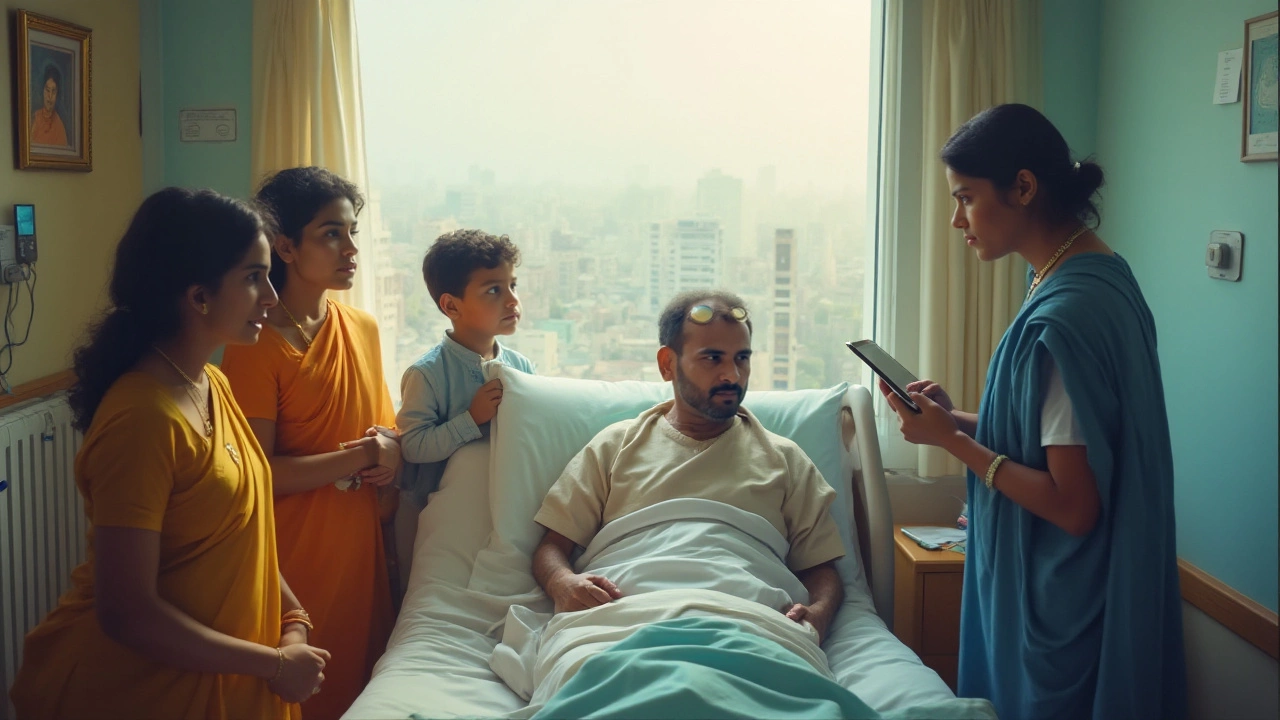
Heart surgery is a transformative experience, not just for the body, but for the mind as well. Patients often anticipate the physical challenges of recovery, such as pain and fatigue, but many are unprepared for the unexpected changes in behavior that can accompany their healing process.
Understanding these strange behaviors and acknowledging their existence is crucial for anyone undergoing heart surgery, as well as their loved ones. Recognizing these patterns can facilitate smoother transitions during recovery, reduce anxiety, and improve emotional well-being.
Emotional Changes
After undergoing heart surgery, many patients find themselves wrestling with an array of emotional challenges that were unexpected. These emotional changes can be disconcerting and may include swings ranging from unexplained sadness to heightened anxiety. One contributing factor often lies in the physiological response to surgery; as the body channels its energy towards healing, emotional resilience can temporarily wane. Moreover, the use of anesthesia and medications during and after the procedure can also impact emotional stability.
Post-operative depression is not uncommon, with studies suggesting that up to 50% of patients might experience it to some degree. This can manifest through feelings of hopelessness, irritability, or a lack of interest in activities that previously brought joy. These feelings are compounded by the stress of altering one's daily activities and adjusting lifestyle habits to accommodate the demands of recovery. Potential contributors to these emotional upheavals include the physical discomfort experienced during recovery, concerns about one's mortality, and the necessity for prolonged dependence on caregivers, which can spur feelings of helplessness.
To illustrate, Dr. John Doe, a renowned cardiologist, explains, "It's crucial to recognize that these emotional changes are a normal part of the healing process. Encouraging patients to speak about their feelings can considerably aid their recovery."
"Acknowledging emotional changes as a normal response to such a significant life event can foster patience and kindness towards oneself," advises Dr. Jane Smith, a clinical psychologist who specializes in post-surgical care.
Essentially, the emotional disturbances post-surgery can also mirror a patient's psychological reaction to the trauma of the operation itself. The heart holds not just a functional significance, but a symbolic one, reinforcing the gravity of interventions required to repair it. Recovery, then, becomes a dual battle—balancing physical and emotional rehabilitation. It is vital to recognize that these challenges, while tough, are faced by many others too and are a temporary phase in their journey to well-being. Understanding the connection between heart surgery recovery and emotional well-being is critical here.
In managing these changes, it helps to maintain open lines of communication with healthcare providers, expressing not just physical discomforts, but emotional derailments too. Offering support groups and counseling services can be instrumental in helping patients navigate this tumultuous time. Healthcare professionals may advocate for light physical activity, such as walking, which can elevate mood and stimulate the release of endorphins. As each patient's journey is unique, it's often a process of trial and error to find what facilitates the best recovery emotionally.
Cognitive Disturbances
Undergoing heart surgery can be a life-saving procedure, yet it often comes with unexpected cognitive disturbances during recovery. Patients typically encounter a range of mental changes that can be both bewildering and distressing. These issues can manifest as memory lapses, confusion, or even difficulties in concentration. Often called "postoperative cognitive dysfunction" (POCD), this condition affects up to 10% of patients after cardiac procedures, though the figure can vary based on individual circumstances. The link between heart surgery and cognitive disturbances stems mainly from the use of anesthesia, the stress of surgery, and the impact on the body's circulatory system. While these cognitive changes are generally temporary, they can last from a few days to several months, impacting a patient’s quality of life significantly during recovery.
The complexity of the human brain means understanding cognitive disturbances requires thorough examination. The symptoms associated with POCD aren't always uniform; some patients may show subtle signs of mental sluggishness, making it easy to dismiss this as mere tiredness. In other cases, the effects could be more prominent, resembling the symptoms of dementia or amnesia. These disturbances can be particularly alarming for both patients and their families, causing significant concern about long-term mental health. While in-depth studies continue to scrutinize these phenomena, some researchers like distinguished neurologist Dr. James Stein, have noted,
"The intricate interplay between surgical procedures and cognitive functions remains one of the enigmas of modern medicine."Such insights emphasize the need for awareness and early intervention to mitigate these challenges.
For medical professionals, recognizing and documenting these changes is crucial. Therapeutic efforts aimed at minimizing cognitive disturbances post-surgery often include counseling, mental exercises, and sometimes medications. Importantly, engaging in activities that stimulate cognitive functions, like puzzles or learning new skills, can aid recovery. Families play a pivotal role in this, by providing both emotional support and encouraging mentally stimulating environments. It can be beneficial for caregivers to maintain a diary that notes any fluctuations in cognitive function, helping professionals tailor care to the patient’s specific needs. Strong patient care strategies are essential in ensuring these disturbances are managed effectively, reducing stress and improving eventual outcomes.

Physical Symptoms
Undergoing heart surgery is a Herculean task for the human body, and the aftermath can manifest in myriad physical symptoms that may seem bewildering at first. Many patients report drastic changes that, while temporary, require attention and understanding. One of the most commonly discussed heart surgery recovery issues is persistent fatigue. This isn't just tiredness; it's a deep-seated exhaustion that feels almost impossible to shake off. It's the body's way of signaling the immense energy it's channeling into healing and mending the heart. Patients often find themselves needing more sleep and rest than they anticipated, a process that can span weeks or even months.
Another symptom that might catch patients off guard is swelling, particularly around the legs and feet. This can be attributed to fluid retention, a common side effect post-surgery. The heart may take its time to regain full efficiency in pumping blood, allowing fluids to accumulate in extremities. Elevating legs and wearing compression stockings are practical steps to mitigate this issue. Additionally, it's crucial to note that chest and shoulder pain can linger. This discomfort should not be confused with angina or heart problems but is often a result of the surgical procedure itself, as the chest muscles recover from being opened.
Appetite changes are also a significant concern. Some individuals might experience a decreased desire to eat, either due to medication side effects or simply the stress and trauma of surgery. It's vital to maintain a balanced diet to support recovery, even if meals need to be smaller and more frequent. Food provides the necessary nutrients and energy for healing damaged tissues and promoting overall wellness. In a related vein, gastrointestinal issues such as constipation can occur because of reduced physical activity and pain medication use. Including fiber-rich foods and adequate hydration in the diet can help counteract this.
Additionally, sensory changes, particularly in taste, have been noted. Foods might taste differently post-operatively, which can affect dietary habits. Some patients even report a metallic taste, potentially related to the anesthesia or medications administered during the hospital stay. While most changes in taste are temporary, understanding these seemingly small details can make a substantial difference in patient care. Over time, as the body adjusts and restores balance, most physical symptoms begin to fade, but they warrant patience and mindfulness from the individual and their caregivers.
According to Dr. Christopher Cannon of the Harvard Heart Letter, "Patients often underestimate the physical aftermath of cardiac surgery, but recognizing and managing these symptoms is crucial for a full, healthy recovery." Taking heed of this wisdom can encourage a more proactive approach to addressing physical changes after heart procedures, paving the way for effective recovery and improved quality of life.
While the journey might initially be fraught with discomfort, understanding these post-surgery behaviors allows patients to navigate their path to health with confidence and calm. Prioritizing personal health and adhering to a supportive environment set the stage for a successful recovery.
Coping Strategies
After experiencing heart surgery, many patients are bewildered by the unexpected emotional rollercoaster that can ensue. This period is often daunting due to the unfamiliar mental and emotional changes they encounter. Understanding how to navigate this crucial stage of recovery is key to regaining a sense of normalcy and mental well-being. One effective method is practicing mindfulness and relaxation techniques, such as meditation or yoga, which have been shown to alleviate stress and promote serenity. Engaging in these activities can provide a calming effect, helping patients remain present and grounded during challenging times. In turn, this can reduce anxiety and improve overall mood.
Building a supportive and understanding environment is also paramount to coping effectively. It's crucial for both patients and caregivers to foster open communication, allowing for the expression of emotions without judgment. This interaction can strengthen relationships and provide a strong buffer against the rollercoaster of emotions often faced after cardiac surgery. Encouraging patients to participate in support groups, either in-person or virtually, can offer a sense of community and shared experience. These groups often provide invaluable insights and practical advice from others who have gone through similar experiences, enhancing recovery.
Additionally, setting realistic expectations is important for managing post-surgery behaviors. Patients should be reminded that healing is a gradual process, with its share of ups and downs. Recognizing that emotional fluctuations and cognitive disturbances are part of the journey can help manage disappointment and frustration. Associating with mental health professionals, if needed, is another solid strategy. Many patients find therapeutic support beneficial in addressing the psychological aspects of recovery. Therapy offers a safe space to explore emotions and develop strategies for navigating the complex landscape of post-surgery recovery.
A healthy lifestyle also plays a vital role in coping with the aftermath of heart surgery recovery. Incorporating a balanced diet rich in nutrients, maintaining regular exercise tailored to the patient's abilities, and ensuring adequate sleep can significantly bolster both physical and mental recovery. For instance, research highlights that regular moderate exercise can enhance cognitive function, uplift mood, and reduce depressive symptoms. Encouraging this holistic approach enables a more resilient recovery, offering benefits beyond traditional measures.
Perhaps one of the most encouraging strategies is focusing on incremental progress. Setting small, achievable goals can give patients a sense of accomplishment and keep motivation high. For example, gradually increasing daily physical activity or setting targets for cognitive exercises can offer measurable progress. This approach not only aids in the physical aspect of recovery but also provides a psychological boost, reinforcing the belief in one's ability to heal.
"Recovery is not a race, but a journey that unfolds at its own pace," reminds Dr. Jane Goodall, a renowned specialist in post-operative care. This perspective emphasizes the need for patience and persistence as essential companions during recovery.
The convergence of strategic coping methods, understanding, and support forms the backbone for managing unusual post-surgery behaviors. By implementing these strategies, both patients and caregivers can forge a proactive path to recovery, celebrating each milestone and embracing the healing journey with resilience and hope.

Support Systems
When navigating the recovery landscape after heart surgery, the importance of an unyielding support system cannot be overstated. These networks, which often comprise family, friends, healthcare providers, and professional counselors, play a pivotal role in ensuring that patients regain not only their physical health but also their emotional and psychological well-being. It is crucial that patients feel enveloped by a web of care that addresses each facet of recovery, from the tangible medical needs to the less visible emotional struggles that often accompany major surgical interventions.
One significant component of post-surgery behaviors is the emotional upheaval many patients experience. A robust support system is essential in providing stability during these turbulent times. Loved ones should be aware that patients may exhibit a range of emotions, from anxiety and anger to inexplicable bouts of sadness. By anticipating these changes, caregivers can offer empathy and understanding. According to the Mayo Clinic, fostering open communication channels can mitigate feelings of isolation, enabling the patient to voice concerns and queries without fear of judgment.
The Role of Family and Friends
Family and friends form the backbone of a patient's recovery. They are often the first line of defense against feelings of loneliness and despair. Their presence offers not just physical assistance but also emotional reinforcement. Simple acts, such as accompanying a patient on a short walk or remaining present during moments of frustration, can prove to be incredibly uplifting. Studies reveal that patients surrounded by a strong personal support network tend to recover faster and with fewer complications compared to those who face their recovery alone.
Another aspect of support is participation in support groups. These groups provide patients with a platform to share experiences, seek advice, and draw inspiration from others who have walked similar paths. While friends and family offer love and comfort, interaction with peers who have undergone heart surgery can supply invaluable insights and reassurance. Many hospitals and health organizations facilitate such groups, recognizing their effectiveness in improving patient outcomes.
Healthcare Providers
Healthcare providers are a crucial part of the support framework. Surgeons, nurses, physical therapists, and mental health professionals collaborate to offer a comprehensive care strategy tailored to the individual needs of each patient. It is vital that patients maintain open communication with their healthcare team, reporting any concerns or unusual behaviors experienced during recovery. A study conducted by the British Heart Foundation reveals that continuous engagement with healthcare professionals not only aids in identifying potential complications early but also provides reassurance to both patients and their families.
"Healing is a matter of time, but it is sometimes also a matter of opportunity." – Hippocrates
Lastly, professional counselors and therapists can play an essential role in helping patients process their emotions and adjust to post-surgery life. Their expertise in navigating the emotional and psychological aftermath of major health events can be a tremendous asset to patients struggling with unexpected changes. Therapy sessions offer a safe space for individuals to articulate their feelings and develop coping strategies, ultimately aiding in a smoother recovery.
In conclusion, the post-surgery journey is undeniably challenging and multilayered, involving an often underestimated emotional dimension. But with a strong, multifaceted support system in place, patients are empowered to navigate the complexities of recovery with resilience and optimism.





Rohan Talvani
I am a manufacturing expert with over 15 years of experience in streamlining production processes and enhancing operational efficiency. My work often takes me into the technical nitty-gritty of production, but I have a keen interest in writing about medicine in India—an intersection of tradition and modern practices that captivates me. I strive to incorporate innovative approaches in everything I do, whether in my professional role or as an author. My passion for writing about health topics stems from a strong belief in knowledge sharing and its potential to bring about positive changes.
view all postsWrite a comment